Publications /
Policy Paper
Déjà illustré par le retournement diplomatique des années 1970, le débat stratégique américain sur la Chine est ancien. C’est dans les années 1990 qu’il prend toute son ampleur cependant : au lendemain de la chute de l’URSS et à la veille des bouleversements du 11 septembre 2001, alors que la puissance chinoise commence à s’envoler sur les terrains économiques et militaires, la communauté de politique étrangère américaine multiplie les analyses sur ce nouveau grand acteur des relations internationales.
La puissance chinoise va-t-elle dépasser voire remplacer une puissance américaine en déclin ? Ses ambitions sont-elles régionales ou mondiales ? La Chine a-t-elle développé un projet libéral pour le monde ou souhaite-t-elle devenir une puissance simplement commerciale ?
Le gouvernement communiste de Pékin, peu respectueux des droits de l’homme, peut-il évoluer vers plus de démocratie ? L’intégration du pays dans le commerce international peut-elle favoriser une telle évolution ? L’Amérique doit-elle jouer un rôle dans ce domaine ?
Faut-il se préparer à un affrontement armé entre les États-Unis et la Chine, qui aurait à l’ère nucléaire des répercussions effroyables? Comment éviter une telle issue ?
Depuis le rapprochement de Kissinger (école réaliste) jusqu’aux rodomontades de Donald Trump (courants jacksonien et hamiltonien), en passant par le « pivot » vers l’Asie de Barack Obama (projet de containement), les différentes écoles de pensée de la politique étrangère américaine trouvent ici un terrain de réflexion crucial pour le XXIe siècle.







